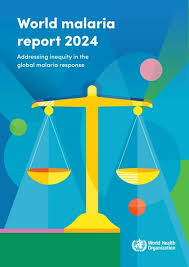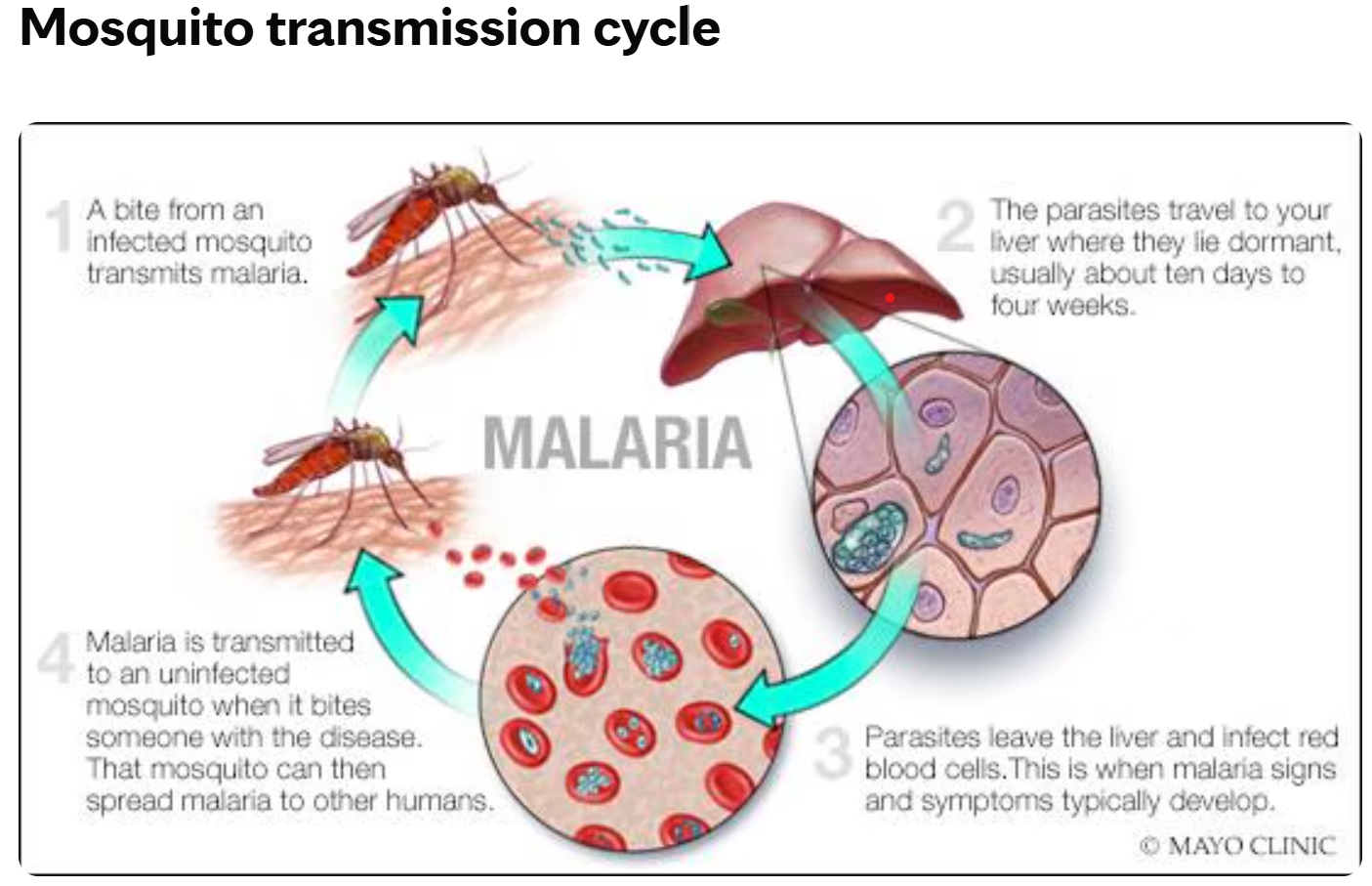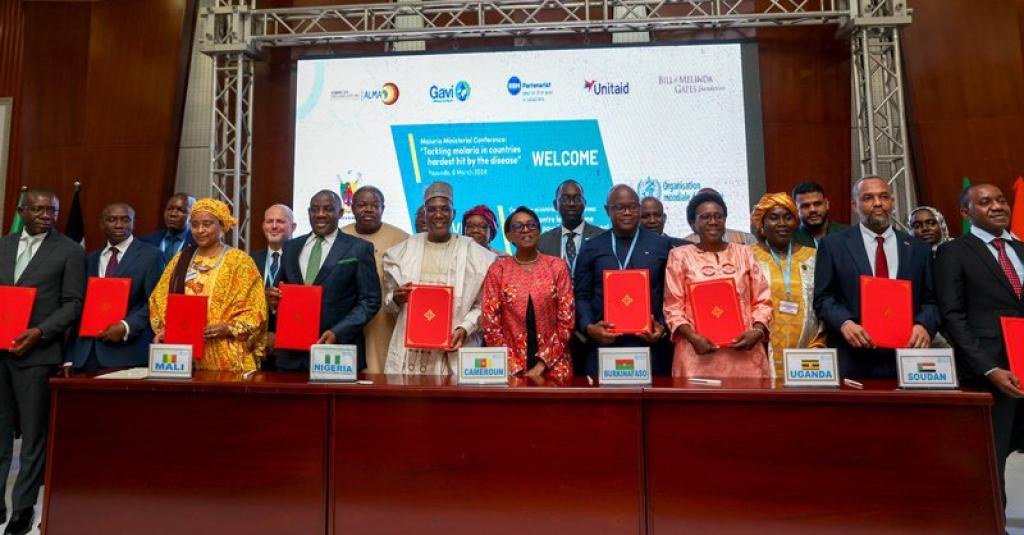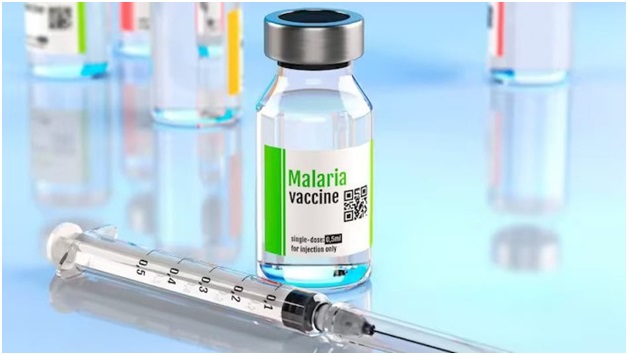World Malaria Report 2024

- 12 Dec 2024
In News:
The World Malaria Report 2024 released by the World Health Organization (WHO) highlights significant progress in malaria control, particularly in India, but underscores the continued burden of malaria in Southeast Asia, where India accounts for half of all malaria cases.
About Malaria:
- Cause: Malaria is caused by Plasmodium parasites, primarily P. falciparum and P. vivax, transmitted through bites from infected female Anopheles mosquitoes.
- Transmission: Non-contagious; transmitted via mosquito bites.
- Symptoms: Fever, chills, and headaches appear 10–15 days after the mosquito bite. In some individuals, the symptoms may be mild.
- Prevention: Includes vector control strategies like insecticide-treated bed nets and indoor spraying. Malaria is treatable with early diagnosis and prompt medication.
India’s Malaria Status:
- Progress:
- India has made significant strides in reducing malaria, with cases decreasing from 22.8 million in 2000 to 4 million in 2023, a reduction of 82.4%.
- Similarly, malaria-related deaths dropped by 82.9%, from 35,000 in 2000 to 6,000 in 2023.
- Exit from High-Burden-High-Impact (HBHI) Group:
- India exited this group in 2024, signaling its success in reducing malaria burden.
- Cases dropped by 69% (from 6.4 million in 2017 to 2 million in 2023), and deaths fell by 68% (from 11,100 to 3,500 in the same period).
Key Strategies Behind India's Success:
- Artemisinin-Based Combination Therapy (ACT): Used to treat malaria effectively.
- Long-Lasting Insecticidal Nets (LLIN): Widely deployed to control mosquito populations.
- Targeted Interventions: Focused on forested and tribal areas where malaria transmission is higher, particularly in states like Jharkhand, Odisha, and the North-East.
- Effective Monitoring: Ensures proper implementation of strategies and interventions.
WHO's Global Malaria Report 2024 Highlights:
- Global Burden: In 2023, there were 263 million malaria cases globally and 597,000 deaths. The African region remains the hardest hit, accounting for 95% of malaria deaths.
- Progress Since 2000: Malaria incidence and deaths have significantly decreased. The global number of malaria cases and deaths dropped substantially, with over 2.2 billion cases and 12.7 million deaths averted.
- Malaria-Free Countries: As of November 2024, 44 countries and one territory, including Egypt, have been certified malaria-free.
- Emerging Threats: Drug resistance (especially to Artemisinin) and insecticide resistance are growing concerns, affecting control efforts.
India and Southeast Asia:
- India contributes nearly half of the malaria cases in Southeast Asia, while Indonesia accounts for about one-third. Despite progress, India and Indonesia together accounted for 88% of malaria deaths in the region.
- South-East Asia Progress: The region reduced malaria cases by 82.4% from 22.8 million in 2000 to 4 million in 2023. Timor-Leste and Bhutan reported zero indigenous malaria cases in 2023.
Global Recommendations:
- WHO stresses the need for continued investment, innovative strategies, and targeted actions, especially in high-burden areas like Africa, to sustain progress and tackle remaining challenges, such as drug resistance, insecticide resistance, and new vector species like Anopheles stephensi, which thrives in urban areas.
Egypt becomes 2nd country in 2024 to be declared ‘malaria-free’

- 22 Oct 2024
In News:
Egypt was officially declared ‘malaria-free’ by the World Health Organization (WHO).
Key Highlights:
- Egypt became the second country (after Cabo Verde) to be certified malaria-free in 2024.
- It is the fifth African country to achieve this milestone, joining Morocco, UAE, and Cabo Verde in the malaria-free list.
- WHO Certification Criteria:
- A country is certified malaria-free if it can prove the Anopheles mosquito-borne malaria transmission chain has been broken for at least three years.
- The country must also have the capacity to prevent the re-establishment of transmission.
- About Malaria:
- Malaria is an acute febrile illness caused by Plasmodium parasites, transmitted through the bites of infected female Anopheles mosquitoes.
- It is a life-threatening disease primarily found in tropical countries.
- Symptoms include fever, headache, and chills, which can be mild and difficult to diagnose.
- Prevention mainly involves vector control interventions, and treatment involves early diagnosis and use of antimalarial drugs.
Health ministers of 11 African countries commit to end malaria deaths

- 11 Mar 2024
Why is it in the News?
In a historic gathering in Cameroon’s capital Yaoundé, African health ministers, global malaria partners, funding agencies, scientists, civil society organizations and other principal malaria stakeholders pledged to end malaria deaths, especially given the tools and systems available.
What is the Yaounde Declaration?
- The Yaounde Declaration was endorsed by health ministers from 11 African nations with the highest malaria burden, aiming to expedite efforts to eliminate malaria-related deaths.
- Signed during the Yaoundé conference, co-hosted by the World Health Organization (WHO) and the Government of Cameroon, the declaration underscores a collective commitment to combat malaria.
- The signatory countries include Burkina Faso, Cameroon, the Democratic Republic of the Congo, Ghana, Mali, Mozambique, Niger, Nigeria, Sudan, Uganda, and Tanzania, together accounting for approximately 70% of the global malaria burden.
- Commitments entail stronger leadership and increased domestic funding for malaria control programs, leveraging data technology, adhering to updated technical guidance, and intensifying efforts at national and sub-national levels.
- Ministers pledged augmented health sector investments to fortify infrastructure, personnel, and program implementation, fostering multi-sectoral collaboration, and cultivating partnerships for funding, research, and innovation.
- Signatories affirmed their resolute dedication to hasten malaria mortality reduction and to ensure mutual accountability for the declaration's outlined commitments.
Current Status of Malaria:
- Between 2019 and 2022, global malaria cases increased from 233 million to 249 million, with Africa experiencing a substantial rise from 218 million to 233 million cases, highlighting the continent as the epicenter of the malaria crisis.
- The 11 African countries represented at the conference bear the highest burden of malaria infections and deaths.
Progress and Challenges:
- Despite some progress, malaria incidence has only declined by 7.6% and mortality by 11.3%, falling short of the African Union’s interim goals.
- Only seven out of 46 member states have achieved a 40% reduction in malaria incidence or mortality.
- Urgent action is imperative to bridge a financial gap of $1.5 billion to sustain basic malaria services, especially for vector control.
- Additional funding of $5.2 billion annually for progress towards elimination and $11 billion for climate adaptation in the health sector is crucial to avert significant surges in cases and deaths, particularly among vulnerable populations like children and pregnant women.
R21/Matrix-M vaccine (The Hindu)

- 04 Oct 2023
Why in the News?
The WHO has given its thumbs-up to the R21 vaccine, the second malaria vaccine they've recommended, following the RTS, S/AS01 vaccine, which got their approval in 2021. Right now, the WHO is closely examining this vaccine for prequalification, which is like their gold seal of approval. Once it's prequalified, organizations like GAVI (a global vaccine alliance) and UNICEF can purchase the vaccine from the manufacturers.
About the R21/Matrix-M Vaccine:
- It's a new vaccine designed to protect children from malaria.
- The University of Oxford and the Serum Institute of India developed it, with support from the European and Developing Countries Clinical Trials Partnership (EDCTP), the Wellcome Trust, and the European Investment Bank (EIB).
- This vaccine is a game-changer as it's the first one to meet the WHO's target of 75% effectiveness.
- Burkina Faso, Ghana, and Nigeria have already given the green light for its use.
- In early 2024, these African countries will start administering the vaccine, and by mid-2024, it will be available in other countries too.
